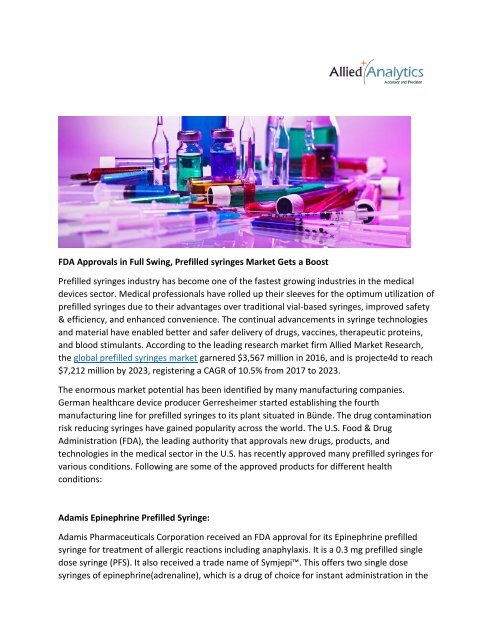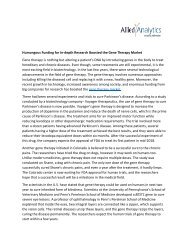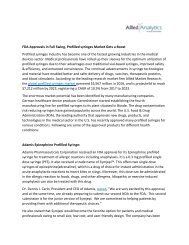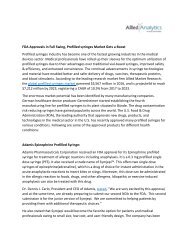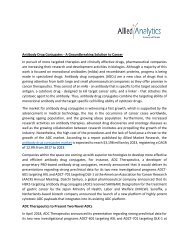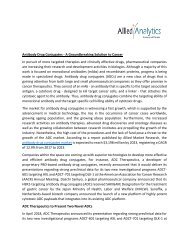Prefilled Syringes Market
The benefits of using prefilled syringes, such as lower risk of infection, higher precision, and standardization over traditional syringes, are expected to attract the patients with chronic diseases and fuel the innovations and market growth of prefilled syringes.
The benefits of using prefilled syringes, such as lower risk of infection, higher precision, and standardization over traditional syringes, are expected to attract the patients with chronic diseases and fuel the innovations and market growth of prefilled syringes.
Create successful ePaper yourself
Turn your PDF publications into a flip-book with our unique Google optimized e-Paper software.
FDA Approvals in Full Swing, <strong>Prefilled</strong> syringes <strong>Market</strong> Gets a Boost<br />
<strong>Prefilled</strong> syringes industry has become one of the fastest growing industries in the medical<br />
devices sector. Medical professionals have rolled up their sleeves for the optimum utilization of<br />
prefilled syringes due to their advantages over traditional vial-based syringes, improved safety<br />
& efficiency, and enhanced convenience. The continual advancements in syringe technologies<br />
and material have enabled better and safer delivery of drugs, vaccines, therapeutic proteins,<br />
and blood stimulants. According to the leading research market firm Allied <strong>Market</strong> Research,<br />
the global prefilled syringes market garnered $3,567 million in 2016, and is projecte4d to reach<br />
$7,212 million by 2023, registering a CAGR of 10.5% from 2017 to 2023.<br />
The enormous market potential has been identified by many manufacturing companies.<br />
German healthcare device producer Gerresheimer started establishing the fourth<br />
manufacturing line for prefilled syringes to its plant situated in Bünde. The drug contamination<br />
risk reducing syringes have gained popularity across the world. The U.S. Food & Drug<br />
Administration (FDA), the leading authority that approvals new drugs, products, and<br />
technologies in the medical sector in the U.S. has recently approved many prefilled syringes for<br />
various conditions. Following are some of the approved products for different health<br />
conditions:<br />
Adamis Epinephrine <strong>Prefilled</strong> Syringe:<br />
Adamis Pharmaceuticals Corporation received an FDA approval for its Epinephrine prefilled<br />
syringe for treatment of allergic reactions including anaphylaxis. It is a 0.3 mg prefilled single<br />
dose syringe (PFS). It also received a trade name of Symjepi. This offers two single dose<br />
syringes of epinephrine(adrenaline), which is a drug of choice for instant administration in the
acute anaphylactic reactions to insect bites or stings. Moreover, this dose can be administrated<br />
in the allergic reaction to foods, drugs, and other allergens. Idiopathic or exercise-induced<br />
anaphylaxis can also be treated with this drug.<br />
Dr. Dennis J. Carlo, President and CEO of Adamis, stated, “We are very excited by this approval,<br />
and at the same time, are already preparing to submit our second NDA to the FDA. This second<br />
submission is for the junior version of Symjepi. We are committed to helping patients by<br />
providing them with additional therapeutic choices.”<br />
He also stated that Symjepi would become the favorite option for patients and medical<br />
professionals owing to small size, low cost, and user-friendly design. The company has been<br />
seeking commercialization options and discussions with potential partners have been<br />
conducted to widen patient access.<br />
Genentech’s Lucentis 0.3 mg:<br />
Genentech revealed that the FDA has approved Lucentis 0.3 mg prefilled syringe for treatment<br />
of diabetic retinopathy condition with or without diabetic macular edema(DME). The company<br />
stated that this syringe has been made available from the second quarter of 2018. This syringe<br />
is made up of borosilicate glass and a single-use sterile & sealed tray is used to package. It<br />
eliminates a lot of preparation work of medical professionals and enables them to administrate<br />
Lucentis instantly. Physicians do not have to pull the medicine from vial, disinfect it, or attach<br />
the needle with the help of administration method. The FDA has also approved Lucentis 0.5 mg<br />
prefilled syringe for macular edema after retinal vein occlusion, wet age-related macular<br />
degeneration, and myopic choroidal neovascularization.<br />
“With the PFS, physicians will have a new option for administering Lucentis to the hundreds of<br />
thousands of people in the U.S. diagnosed with either wet AMD or macular edema after RVO,”<br />
said Sandra Horning, MD, chief medical officer and head of global product development at<br />
Genentech. “Today’s approval of the Lucentis 0.3 mg prefilled syringe reinforces our<br />
commitment to advancing therapy for those impacted by this vision-threatening disease.”<br />
The FDA has also approved Lucentis 0.5 mg prefilled syringe for macular edema after retinal<br />
vein occlusion, wet age-related macular degeneration, and myopic choroidal<br />
neovascularization. The press release on approval of Lucentis 0.3 mg syringe also stated that<br />
physicians and medical professionals can take off the syringe cap, connect an injection needle<br />
to syringe, and adjust the dose prior to administration. The 0.3 mg syringe needs to be prefilled<br />
with an anti-VEGF agent. This agent has been approved the FDA for treatment of diabetic<br />
retinopathy and DME.<br />
Philip Storey, MD, MPH at the Wills Eye Conference and colleagues found that anti-VEGF<br />
injection administrated via prefilled syringe lowers the risk of endophthalmitis as compared to<br />
administration through the conventional method of injection. Storey said, “The odds of
endophthalmitis infection was 2.5 times higher with the conventional medication than with the<br />
prefilled medication.”<br />
After careful consideration and pool of data, Storey and team discovered that an incidence of<br />
endophthalmitis when injection was given through prefilled syringes was one in 9,050, while it<br />
was one in 3,413 through the conventional method of injection. This showed that prefilled<br />
syringes offer a safer way to administrate drugs in patients. The industry has been riding on a<br />
trend of innovation to address concerns regarding safety of conventional way of injection. More<br />
innovative products will be launched and approved by the FDA in coming years.<br />
Read more at: https://www.alliedmarketresearch.com/prefilled-syringes-market


